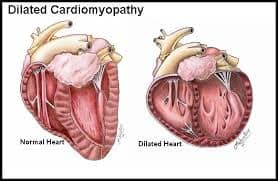FDA Investigation into Potential Link between Certain Diets and Canine Dilated Cardiomyopathy
February 19, 2019In July 2018, the FDA announced that it had begun investigating reports of canine dilated cardiomyopathy (DCM) in dogs eating certain pet foods containing a high proportion of peas, lentils, other legume seeds (pulses), and/or potatoes in various forms (whole, flour, protein, etc.) as main ingredients (listed within the first 10 ingredients in the ingredient list, before vitamins and minerals).
Many of these case reports included breeds of dogs not previously known to have a genetic predisposition to the disease. The FDA’s Center for Veterinary Medicine (CVM) and the Veterinary Laboratory Investigation and Response Network (Vet-LIRN), a collaboration of government and veterinary diagnostic laboratories, continue to investigate this potential association. Based on the data collected and analyzed thus far, the agency believes that the potential association between diet and DCM in dogs is a complex scientific issue that may involve multiple factors.
We understand the concern that pet owners have about these reports: the illnesses can be severe, even fatal, and many cases report eating “grain-free” labeled pet food. The FDA is using multiple science-based investigative tools as it strives to learn more about the evolution of this outbreak of DCM and its potential link to certain diets or ingredients.This update does not include reports received in December and January due to the lapse in appropriations from December 22, 2018, to January 25, 2019. Because the Anti-Deficiency Act does not except activities that are solely related to protecting “animal health,” FDA was not able to continue its investigation during that time.

Cases Reported to FDA
For the purposes of this investigation, the FDA defines a “case” as an illness reported to FDA involving a dog or cat that includes a diagnosis of DCM. Many of the reports submitted to the FDA included very supportive clinical information, including echocardiogram results, cardiology/veterinary records, and detailed diet histories.
The numbers below only include reports in which a veterinarian made a formal diagnosis of DCM. We did not include, in these numbers, the many general cardiac reports submitted to the FDA that did not have a DCM diagnosis. This case information is still valuable, as it may show heart changes that occur before a dog develops full-blown DCM. (Please see the Vet-LIRN DCM Update for more technical information on the reported cases, including those without a formal diagnosis of DCM).
Between January 1, 2014 and November 30, 2018, the FDA received 300 reports of DCM (294 canine reports, 6 feline reports). Approximately 276 of these were reported after the July public notification about FDA’s investigation (273 canine reports, 3 feline reports). Some of these reports involved more than one affected animal from the same household. The breakdown of reported illnesses below reflects the number of individual animals affected.
Animal numbers in DCM Reports received between January 1, 2014 and November 30, 2018
| Number of reactions | Number of deaths | |
|---|---|---|
| Dogs | 325 | 74 |
| Cats* | 10 | 2 |
*Cats are generally more likely to develop hypertrophic cardiomyopathy (a heart disease)
Dilated cardiomyopathy is recognized as a genetic condition in dogs, typically in large or giant breeds, such as the Doberman Pinscher, Great Dane, or the Irish Wolfhound. It is also seen in Cocker Spaniels. It is believed to be less common in small and medium breed dogs. We suspect that cases are underreported because animals are typically treated symptomatically, and testing and treatment can be complex and costly to owners. Because the occurrence of different diseases in dogs and cats is not routinely tracked and there is no widespread surveillance system like the Centers for Disease Control has for human health, we do not have a measure of the occurrence of disease apart from what is reported to the FDA.


